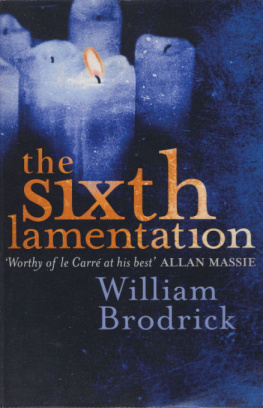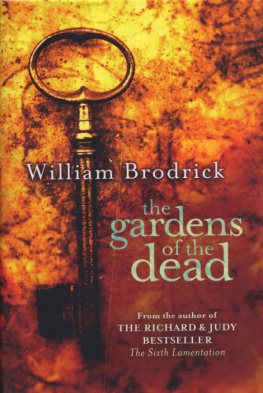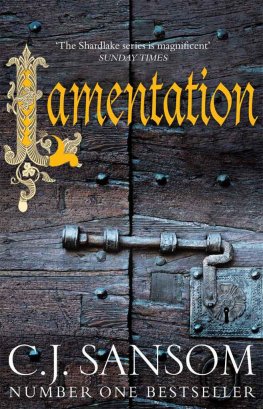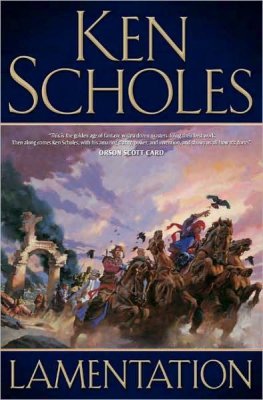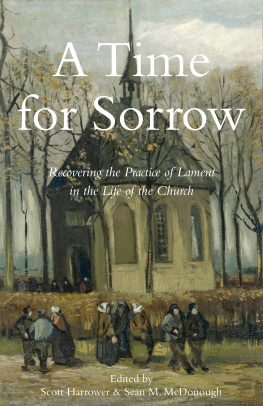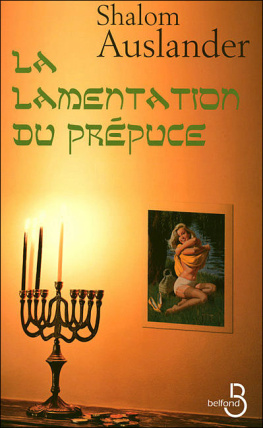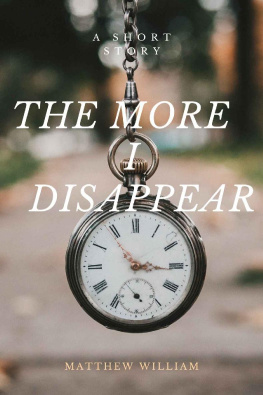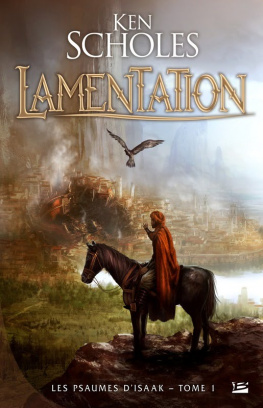William Brodrick - The 6th Lamentation
Here you can read online William Brodrick - The 6th Lamentation full text of the book (entire story) in english for free. Download pdf and epub, get meaning, cover and reviews about this ebook. genre: Detective and thriller. Description of the work, (preface) as well as reviews are available. Best literature library LitArk.com created for fans of good reading and offers a wide selection of genres:
Romance novel
Science fiction
Adventure
Detective
Science
History
Home and family
Prose
Art
Politics
Computer
Non-fiction
Religion
Business
Children
Humor
Choose a favorite category and find really read worthwhile books. Enjoy immersion in the world of imagination, feel the emotions of the characters or learn something new for yourself, make an fascinating discovery.
- Book:The 6th Lamentation
- Author:
- Genre:
- Rating:4 / 5
- Favourites:Add to favourites
- Your mark:
- 80
- 1
- 2
- 3
- 4
- 5
The 6th Lamentation: summary, description and annotation
We offer to read an annotation, description, summary or preface (depends on what the author of the book "The 6th Lamentation" wrote himself). If you haven't found the necessary information about the book — write in the comments, we will try to find it.
The 6th Lamentation — read online for free the complete book (whole text) full work
Below is the text of the book, divided by pages. System saving the place of the last page read, allows you to conveniently read the book "The 6th Lamentation" online for free, without having to search again every time where you left off. Put a bookmark, and you can go to the page where you finished reading at any time.
Font size:
Interval:
Bookmark:
The Sixth Lamentation
A Novelby
William Brodrick
For mymother
Acknowledgements
Generally speaking, debtsare disagreeable things, especially those that endure. One kind, however, is apleasant exception. I extend my warm gratitude to Ursula Mackenzie who helpedme to produce the book I wanted to write as opposed to the one I had written;to Pamela Dorman for insightful analysis and championing this novel in theUnited States; to Araminta Whitley and Celia Hayley, both of whom have brought meto where I now am; to Nicki Kennedy and Sam Edenborough for ploughing foreignfields on my behalf. Im grateful to Joanne Coen for her patience andscrupulous attention to detail in preparing the text for publication. While Idislike general expressions of thanks, that is the only way I can encompassthe many individuals at Time Warner Books and Penguin Putnam who have worked onthis novel with unstinting dedication: Im grateful to you all.
Ireserve a particular word of thanks for Sarah Hannigan who encouraged me towrite and helped me discover the way I wanted to do it. I also thank: PennyMoreland (who pushed me from doubt to confidence), Austin Donohoe (who urged meto take the risk), Paulinus Barnes (for sound advice), James Hawks (who told meto get on with it); Damien Charnock (who politely remarked upon the prevalenceof sentences without verbs); Nick Rowe (who suggested including a list of principalcharacters); my family (for their part in shaping who I am, and for alwayssmiling upon my endeavours); and my Chambers (for accommodating thepeculiarities of someone who is writing a novel). I am grateful to thefollowing for help with specific enquiries: William Clegg QC; Michael Walsh(Archivist, Heythrop College, University of London); Dr E. Rozanne Elder(Director, Institute of Cistercian Studies, Western Michigan University);Inspector Barbara Thompson (Suffolk Constabulary); Ian Fry and John ArchieWeeks (Old Bailey). I am responsible for any errors of interpretation that mayarise from what I was told.
Ireserve a special paragraph for Anne. Constant selfless support (all manner, inall weather) and solitary childcare (three of them) combined to mark out thespace that made the writing of this book possible. No formal words of thankscan do her justice or reflect what I would like to say
We boththank the community whose quiet presence graces the valley where this novel wasbegun and completed.
Principal Characters
This novel dealswith three generations: those living in Paris during the Occupation, theirchildren, and their offspring: old age, middle age and youth. Each is a bearerof memory, actual or transmitted. It is hoped the following table will furnishsome assistance in holding in mind a number of characters and their place inthe narrative.
The familyof Agnes Embleton (ne Aubret)
Freddie (fatherof Lucy)
Lucy
Charactersmentioned in Agnes journal recounting the resistance activity of The RoundTable:
Father Rochet (parish priest, co-founder of The RoundTable with Madame Klein)
Madam Klein (a Jewish widow, guardian of Agnes)
Jacques Fougres (operational leader of The RoundTable)
Victor Brionne (childhood friend of Agnes andJacques)
Franz Snyman (a Jewish refugee)
Eduard Schwermann (a Nazi Officer)
Monks atNotre Dame des Moineaux:
Father Morel (the Prior)
Father Pleyon (a member of The Round Table; successorto Father Morel)
Father Chambray (librarian who leaves the monasteryafter the war)
The family ofVictor Brionne:
Robert
Othercharacters:
Father Anslem (a monk of Larkwood Priory)
Salomon Lachaise (a Jewish survivor, saved by TheRound Table)
Max Schwermann (grandson of Eduard Schwermann)
Pascal Fougres (descendant of Jacques Fougres)
LOccupation
Aprils tinyhands once captured Paris,
As you oncecaptured me: infant Trojan
Fingers gentlypeeled away my resistance
To your charms.It was an epiphany;
I saw wavingpalms, rising dust, and yes,
I even heard thestones cry out your name,
Agnes.
And then thelight fell short.
I made a pactwith the Devil when the
Spring Windcame, when Priams son lay bleeding
On the ground.As morning broke the scattered
Stones whisperedGod, what have you done? and yes,
I betrayed youboth. Can you forgive me,
Agnes?
(August, 1942)
Translated fromthe French by Father Anselm Duffy
Feast of SaintAgnes
Larkwood Priory,21st January 1998
Part One
Now is the time for the burning of the leaves
(Laurence Binyon, The Burning of the Leaves, 1942)
First Prologue
April1995.
Night and day Ive livedamong the tombs, cutting myself on stones, replied Agnes quietly, searchingher memory.
DoctorScotts eyes narrowed slightly. His East Lothian vowels had lilted overdiagnosis and prognosis, gently breaking the news while Agnes gazed at agleaming spring daffodil behind his head, rising alone from a rogue plant potbalanced on a shelf a present from a patient, perhaps, or free with lots ofpetrol. Soon it would topple and fall.
Sheforgot the flower when those old words, unbidden, rumbled from her mouth. Agnescouldnt place where they came from. Was it something Father Rochet had said,worse for wear, back in the forties? Something shed read? It didnt matter.They were hers now, coming like a gift to name the past: an autobiography.
Agnesglanced at her doctor. He was a nice fellow, at home with neurologicalcatastrophe but less sure of himself with mangled quotation. He lookedover-troubled on her account and she was touched by his confusion.
Do youmean to tell me that, after all Ive been through, Im going to die from adisease whose patron is the Duchess of York?
Imafraid so.
Thatsnot fair, Doctor. Agnes rose from her seat, still wearing her coat and holdingher handbag.
Let meget you a taxi.
No,no, Id rather walk, thank you. While I can.
Ofcourse.
Hefollowed Agnes to the door and, turning, she said, Im not ready yet, Doctor.
No, Imsure youre not. But who ever is?
Agnesbreathed in deeply A sudden unexpected relief turned her stomach, rising thensinking away She closed her eyes. Now she could go home, for good, to Arthur and, funnily enough, to the knights of The Round Table. Shed never noticedthat before.
Agnes had known there wassomething wrong when her speech became trapped in a slow drawl as if shed hadtoo much gin. She let it be. And then she started tripping in the street. Shelet that be. Like so many times before, Agnes only acted when pushed. Shedmade an appointment to see a doctor only after Freddie had snapped.
Theywere walking through Cavendish Square towards the Wigmore Hall. A fine spray ofMarch rain floated out of the night, softly lit from high windows andstreetlamps. Freddie was a few impatient steps ahead and Agnes, trying to keepup, stumbled and fell, cutting her nose and splintering her glasses. Tearswelled as she reached for her frames, not from pain, but because she knewFreddies embarrassment was greater than hers.
Mother,get up, please. Are you all right?
Agnespulled herself to her feet, helped by a passer-by. She wiped her hands upon hercoat as Freddie produced a neatly folded handkerchief. His exasperation spilledover. Look, if somethings wrong, see a doctor. You wont say anything to me.Perhaps youll say something to him. But for Gods sake, he blurted out, stopthis bloody performance.
Agnesknew he would berate himself for hurting her, as she berated herself forfailing him. Neither of them spoke again, save to put in place essentialcourtesies.
No,you first, really.
Thankyou, Freddie.
Aprogramme?
I dontthink so.
Agnesfelt unaccountably tired by the interval so he took her home. She saw DoctorScott within the week and he made the referral. She saw a consultant. Theresults came back. Doctor Scott had given her a call, and now she knew
Next pageFont size:
Interval:
Bookmark:
Similar books «The 6th Lamentation»
Look at similar books to The 6th Lamentation. We have selected literature similar in name and meaning in the hope of providing readers with more options to find new, interesting, not yet read works.
Discussion, reviews of the book The 6th Lamentation and just readers' own opinions. Leave your comments, write what you think about the work, its meaning or the main characters. Specify what exactly you liked and what you didn't like, and why you think so.

